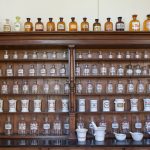JAMES SENSENIG, ND
This column is transcribed from a weekly live conversation produced by the Naturopathic Medical Institute (NMI). The goal of NMI is to preserve and promote the principles of naturopathic philosophy through clinical application, in your offices and in your communities, every day. On October 11, 2017, Dr Jim Sensenig spoke on the importance of gut health. In this lightly edited transcript (by Emily Kane, ND), the third part of a 4-part article, Dr Sensenig discusses the effects of disrupting the gut environment.
Dysfunction as Disease
GERD: Too Little Acid
It is very important for both doctors and patients to understand the actual process of digestion, since there is a popular conception that is promulgated by the medical profession – the gastroenterologist, in particular – that increased stress, especially coupled with the “Type A” personality, increases acid production in your stomach. That is not the case. The autonomic inhibition of the digestive system under stressful conditions is such that it does the opposite.
That brings us to ask how we can have ulcers, etc. With respect to the inhibition of the digestive system, what you get are the digestive diseases we have in the 21st century. Because, if the digestive system is not working in terms of normal peristalsis, enzymes are inadequate for digesting food, and hydrochloric acid output is inhibited, then you are going to get the symptoms that we have today.
Sometimes people under stress will say that they can feel the burning in their stomach and that it comes up into their throat, also that taking acid blockers makes it better. How do you explain that? In the absence of sufficient hydrochloric acid, one does not digest one’s food well or completely, and that eventually leads to fermentation of the food, which in itself causes some acids. Then one experiences that burning sensation in the stomach, what we call heartburn or GERD [gastroesophageal reflux].
GERD is a function of low acid because the fact that the esophageal sphincter or the cardiac sphincter is not sufficiently contracted and is not working properly is a function of low acid itself. The other circumstantial evidence here is that if your heartburn or GERD was caused by stomach acid, you would expect to have those symptoms when you are eating. This is because hydrochloric acid is secreted in response to the food and is mixed with the bolus of food in the stomach to digest that food. If you are the typical heartburn or GERD patient, and your acid levels are increasing while you are eating, or shortly after eating, then you would expect to have problems right away. However, that is rarely the case.
Most people who have these symptoms tend to begin having them 30 to 60 minutes or so later, or classically at night. They have their last meal late in the evening, and they go to bed, and they wake up 3 or 4 hours later with those symptoms. How could that be from the stomach acid?
Sympathetic responses can affect our digestion in this way. Another way is that if you have decreased peristalsis, you are going to have more trouble with constipation and, to some extent, also more inflammation in the gut, etc. If we think as naturopathic doctors, we do not have to consider a lot of these digestive problems as individual disorders like ulcerative colitis, Crohn’s disease, hypochlorhydria, and SIBO, etc. We need to see them as symptoms or manifestations of disturbances in the system, and then put our efforts into correcting the system.
What is happening in conventional medicine, because of their paradigm, is that their research is focused on identifying specific functions of each bacterium, how that particular bug affects that, and how this particular species does this, etc. I can see the medical profession moving into a world where we will have protocols to kill off certain bacteria, and then we will replace them with certain other bacteria. The idea of introducing many or all of these bacteria in a normal, commensal population is not part of the mix. Why not just eat a healthy, high-fiber diet?
There is another piece to this. You cannot just be introducing or removing bacteria and expect health, because if you do not have the right environment, then it doesn’t matter what you put in there, any more than you cannot grow certain plants if the soil doesn’t have the right pH.
Now that we have the technology available to measure what is happening in the stomach, some conventional medicine institutes have come to find out that the inflammatory bowel diseases, GERD, heartburn, etc, are occurring in people who have too little hydrochloric acid, where the ambient pH is too high. They do not understand what is wrong with their research. This is a perfect example of the paradigm. The belief system in conventional medicine is that inflammatory bowel disease, GERD, etc, are caused by elevated acid. Since everybody knows that this is an acid problem, when the research actually contradicts that belief, then the research is obviously wrong, and they just throw the research out.
This goes to show that if you have a certain world view and you start acquiring information that challenges that view, you only have 2 choices. One is that you have to dismiss the information as being faulty because it does not fit your view; the other is that you have to change your world view. This is one of the reasons that the PPIs have such devastating side effects. You block acid and you wind up inhibiting this entire cascade of digestive functions that are initiated by acid – from activating your protein digestion and pancreatic secretion of enzymes, to stimulating peristalsis and changing gastric pH for proper mineral absorption, etc. So, is it any surprise that when you start blocking stomach acid, you get mineral deficiencies and osteoporosis, etc? Even myocardial infarction can result, since minerals such as magnesium depend on adequate acid.
IBS, Crohn’s Disease, Ulcerative Colitis
It is usually not necessary to distinguish between Crohn’s disease and ulcerative colitis, in that both are an inflammation of the gut and are treated in basically the same way. We do have to differentiate between different diseases and different disease states when we have different treatments for them. In conventional medicine, the purpose of diagnosis, the diagnostic endpoint, is to determine what the treatment is going to be, because in that model we treat symptoms, not people. We have to make a distinction between this and that because this gets treated differently than that.
Small Intestinal Bacterial Overgrowth
This may seem arrogant or dismissive to say, but when asked what laboratory I use to test for SIBO, my answer is none; I just treat it. As far as I know, people have had SIBO for most of the 20th century, so why don’t we just correct it? Why do we have to go through this whole process of trying to recognize where the bugs are, etc?
How do you correct it? The conventional approach is using antibiotics. That seems odd because antibiotics also kill most of the other commensal bacteria. How do we know that the bugs we are replacing are the right ones? Wouldn’t it make more sense to change or improve the environment, in other words, make sure that the person is secreting enough hydrochloric acid? Then, theoretically, if you restore the right environment, you don’t have bacteria where they are not supposed to be. That approach has worked very well for me. Now that we have the hydrogen and the methane breath testing available to us, we can be more specific about what we are doing. But does it really make a difference if you are correcting normal function rather than trying to figure out what kills the bacteria?
Helicobacter pylori
This used to be called Campylobacter at one time. Again, the question is whether this is another opportunistic bacterium. In other words, is it there because the conditions are right for it, or the other way around?
Inflammation, Leaky Gut
In naturopathic medicine, we have been talking about leaky gut for the last 20 to 30 years. It has gotten to be parlance of medicine, at least in alternative medicine. Leaky gut is a function, in part, of the disturbances that we have been talking about. Without the proper bacteria, or the proper pH, we are going to see a breakdown of the tight junctions in the intestinal mucosa, which then allows these large molecular-weight proteins to find their way between the enterocytes and move into the systemic circulation rather than go through the cells and into the lacteals that way.
The gut lining should act as a physical barrier and a sieve. When foodstuffs are properly broken down to their smallest components, these small molecular-weight proteins find their way from the lumen of the gut into the lacteals by being transported across the cell wall.
Hypersensitivity Reactions & Bacterial Translocation
When high molecular-weight proteins get through the normal physical and mucosal barrier of the gut, they find their way into the bloodstream and cause all kinds of havoc. An example of this is food sensitivities. We are talking about delayed hypersensitivity responses mediated by IgG. If you have an immune response to a food antigen at the surface of the gut that induces a certain amount of inflammation, that inflammation itself then causes a leaky gut. The more permeable the gut lining, the bigger the humoral IgG immune response to the food in question. It gets to be a vicious downward cycle.
The other side of leaky gut that is not implied by the term and not discussed very often is that those large molecular-weight proteins crossing the mucosal barrier are themselves abnormal. If your digestive function was optimal or what we think it is supposed to be, then digestive enzymes would be breaking the proteins down to their constituent parts – the dipeptides, tripeptides, and amino acids, etc. There would be no larger molecular-weight proteins left to cross the barrier in the first place. So, there are 2 aspects of the leaky gut phenomenon: You have to have incomplete digestion of dietary proteins and you have to have compromised integrity of the mucosal barrier function.
The other thing that becomes problematic with leaky gut is translocation of fragments of the unwanted and even commensal bacteria, such as endotoxin, or LPS, which can find their way into the systemic circulation and cause inflammation elsewhere.
Hiatal Hernia
There are so many people who have a hiatal hernia. You can have all kinds of symptoms with a hiatal hernia, ranging from the classic symptom of GERD-like symptoms, with pressure and burning and esophageal regurgitation, all the way to something as simple as anxiety. Sometimes people who have a hiatal hernia feel full immediately after they eat a little food, or they have a little pain behind the sternum after eating, or shortness of breath, etc.
There are many people with chronic digestive problems who respond instantly to soft tissue manipulation of their stomach and diaphragm.
The Effect of Stress on Digestion
We are living in an incredibly stressful time compared to even a few decades ago. Everybody seems to be running around, hurrying to get things done; nobody thinks there is enough time in their life. This is having a serious effect on our digestive function.
This has to do with the sympathetic and parasympathetic system. Here is the normal cycle: When you are under stress, your body is in the “fight or flight” mode. Unlike humans, animals are not under stress all of the time. The only time an animal in the natural world is in fight or flight is when it is chasing its lunch or when it is lunch. In either case, it is a life-threatening situation; they are both for the purpose of surviving. The only other time an animal is in sympathetic mode is during some phases of copulation, which is also about the survival of the species.
The fight or flight response, or the sympathetic response, is for the purpose of preserving life. It is used in an emergency situation. However, those activities occur in exceedingly short bursts, often only a few seconds. In the case of sex, the orgasm response is not very long either. In the case of chasing your lunch or running from a predator, again, it is a short period of time.
Imagine the situation where a lion and a zebra are in close proximity. They are probably both pretty much in parasympathetic mode until the zebra realizes that a lion is there, and the lion realizes that the zebra just realized that there is a lion, and then they are both off and into the chase. The chase ends rather quickly, within 15 to 30 seconds, most likely. Then the lion is either enjoying a meal, or is sulking back to the tree and the zebra is free to continue to graze.
This may be an over-simplification, but it illustrates the point that the stress response normally occurs for only short bursts of time. When you are in sympathetic mode, your autonomic nervous system turns off your digestion. It is as if the good Lord decided that when you are running for your life, it is not a great time to go to the bathroom, or it is not a great time to spend any extra energy digesting your food; you need every resource you can get to spare your life. This illustrates that the lion is not worrying about the next exam, or whether the IRS is going to audit his books, whether he is going to pick up the kids at school, or if he is going to be on time for an appointment, etc. The stress response is on, then it’s off.
But as humans in this culture, we are living under stress all the time, and we know the effects of high cortisol and adrenal fatigue. When we are under stress, we make less hydrochloric acid, we elaborate fewer enzymes, the environment in the gut changes, peristalsis is decreased, and inflammation is increased, etc. Is it any wonder we have so many digestive diseases as we do today?

James Sensenig, ND was a 1978 graduate of NCNM in Portland, OR. For over 40 years he maintained an eclectic practice in Hamden, CT. Over the years, Dr Sensenig held prominent positions in the various naturopathic colleges and the AANP. A champion of classical naturopathic medicine, Dr Sensenig received an Honorary Doctor of Naturopathic Philosophy degree from CCNM, and received numerous awards for his dedication to teaching the principles of naturopathic medicine.





